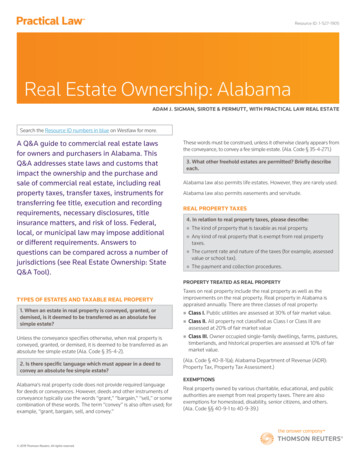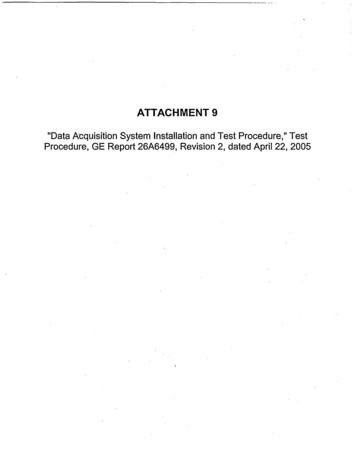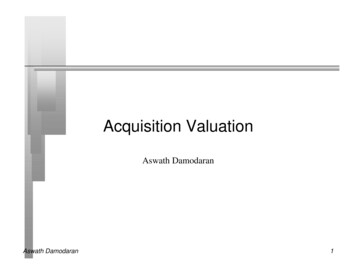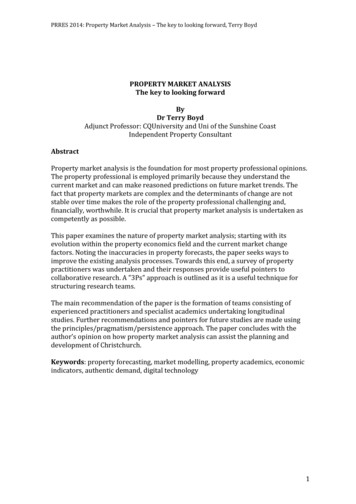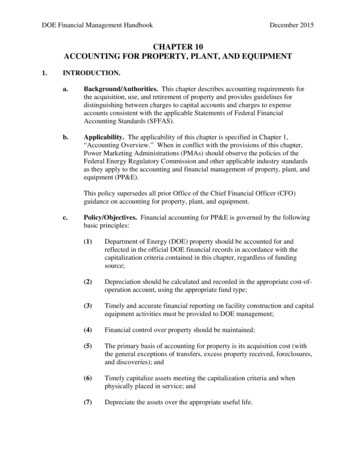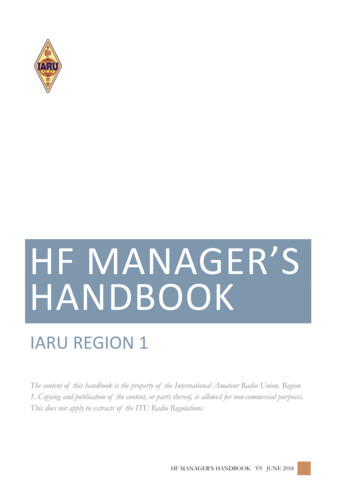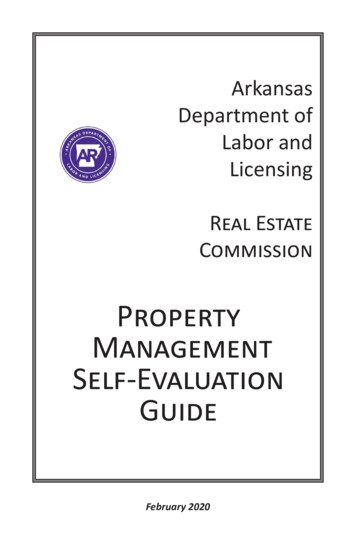
Transcription
Real PropertyACQUISITIONHandbookHow the U.S. General ServicesAdministration Acquires Real Propertyfor Programs and ProjectsGSA Public Buildings Service
Table of ContentsIntroduction . 2CommonTerms Used in Acquiring Real Property . 3Property Appraisal and the Determination of Just Compensation . 6Negotiations . 9Settlement and Condemnation .12Project Contacts .13GSA Public Buildings Service 1
Federal programs designed tobenefit the public may resultin the acquisition of privateproperty and sometimes in thedisplacement of people fromtheir residences, places ofbusiness or farms.The Fifth Amendment to the United StatesConstitution provides that private property maynot be taken for public use without the paymentof just compensation. To provide uniform andequitable treatment of persons whose propertyis acquired for public use, Congress passedthe Uniform Relocation Assistance and RealProperty Acquisition Policies Act of 1970,and amended it in 1987. The law is commonlyreferred to as the Uniform Act. Implementingregulations for the Uniform Act are issuedby the Department of Transportation and canbe found in part 24 of title 49 of the Code ofFederal Regulations. All Federal, state andlocal government agencies, as well as othersreceiving Federal financial assistance forpublic programs and projects that require theacquisition of real property, must comply withthe policies and provisions set forth in theUniform Act.2The acquisition itself does not need to beFederally funded for the Uniform Act to apply.If Federal funds are used in any phase of theprogram or project, the rules and regulations ofthe Uniform Act apply.The Uniform Act requires acquiring agenciesto make “every reasonable effort to acquireexpeditiously real property by negotiation.” 42U.S.C. § 4651. The objective is to encourageagreements with property owners to minimizelitigation and promote public confidence inFederal and federally assisted land acquisitionprograms.This brochure explains the rights of an ownerof real property to be acquired for a federallyfunded program or project. An accompanyingbrochure, entitled “Relocation Handbook,”explains the rights and benefits of a displacedperson under the Federal Relocation AssistanceProgram.
Common TermsUsed in Acquiring Real PropertyACQUISITIONCONDEMNATIONAcquisition is the process of gaining ownershipor control of real property (real estate) or aninterest in real property.Condemnation is the legal process of acquiringprivate property for public use or purposethrough the government’s power of eminentdomain. Condemnation usually is not used untilall attempts to reach a mutually satisfactoryagreement through negotiations have failed. Anagency then goes to court to acquire the neededproperty.AGENCYAn agency can be a governmental organization(Federal, state or local), a nongovernmentalorganization (such as a utility company),or a private person, using Federal financialassistance for a program or project thatacquires real property or displaces aperson. (All references to “Agency” in thisbrochure refer to the U.S. General ServicesAdministration (GSA).)APPRAISALAn appraisal is a written statement preparedindependently and impartially by a qualifiedappraiser setting forth an opinion of definedvalue of an adequately described property as ofa specific date, supported by the presentationand analysis of relevant market information.EASEMENTAn easement is an interest in real property thataffords a person the right to make limited useof another person’s real property. An easementmay be exclusive or non-exclusive and maybe perpetual or expressly limited in duration.Examples of easements are (1) a right-of-way,(2) a right of entry for a stated purpose, (3) aright to the support of land and buildings, (4) aright of light and air, (5) a right to place or keeputilities on another person’s property, (6) aright to the perpetual maintenance of drainagestructures, (7) a right to allow reconstruction ofa driveway during construction, and (8) a rightto do some act that would otherwise constitutea nuisance.“The Fifth Amendment of theConstitution states that privateproperty shall not be taken forpublic use without the paymentof just compensation.”GSA Public Buildings Service 3
Common Terms Used in Acquiring Real PropertyEMINENT DOMAINEminent domain is the right of the governmentto take private property for public use. In theUnited States, just compensation must be paidfor private property acquired in connection withfederally funded programs or projects.FAIR MARKET VALUEFair market value is the price on the date ofvaluation that a property would change handsbetween a willing buyer and a willing seller,neither being under any compulsion to buy or tosell and both having reasonable knowledge ofrelevant facts.INTERESTAn interest is a right, title or legal share insomething. People who share in the ownershipof real property have an interest in the property.INVERSE CONDEMNATIONInverse condemnation is a term used todescribe a situation in which the governmenttakes private property but fails to pay thecompensation required by the Fifth Amendmentto the U.S. Constitution. To be compensated, theowner must then sue the government.JUST COMPENSATIONJust compensation is the price an agency mustpay to acquire real property. An agency officialmust make the estimate of just compensationto be offered for the property, which amountmay not be less than the amount establishedin the approved appraisal report as the fairmarket value for the property. If the ownerand GSA cannot agree on the amount of justcompensation, the amount will be determinedin court.4LIENA lien is a legal claim of one person uponthe property of another person to securethe payment of a debt or the satisfaction ofan obligation. Examples include mortgages,mechanics’ liens and tax liens. As a generalrule, liens must be paid in full when the propertyis sold.MARKET VALUEMarket value is the sales price that a willing andinformed buyer would pay in cash to a willingand informed seller for a particular property.NEGOTIATIONNegotiation is the act of discussing an issuebetween two or more parties with competinginterests with an aim of coming to an agreement.It is the process by which GSA and the seller ofproperty seek to reach an amicable agreementover the terms and conditions of the sale ofproperty. An offer may be made for the purchaseof property in person or by mail, and the offer isdiscussed with the owner.PERSONA person is an individual, family, partnership,corporation, or association.PERSONAL PROPERTYIn general, personal property is property thatcan be moved. It is not permanently attached to,nor a part of, the real property. Personal propertyis not to be included and valued in appraisingreal property.
PROGRAM OR PROJECTA program or project is any activity or seriesof activities undertaken by an agency whereFederal financial assistance is used in anyphase of the activity.UNECONOMIC REMNANT“An agency official mustmake the estimate ofjust compensationA parcel of real property in which the owner isleft with an interest after the partial acquisitionof the owner’s property, and which the agencyhas determined has little or no value or utility tothe owner.to be offered for theWAIVER VALUATIONamount established inThe valuation process used and productproduced when the agency determines that anappraisal is not required. A waiver valuation maybe used for relatively low-value, non-complexacquisitions. A waiver valuation is preparedinstead of an appraisal.property, which amountmay not be less than thethe approved appraisalreport as the fair marketvalue for the property.”GSA Public Buildings Service 5
Property Appraisal and theDetermination of Just CompensationPROPERTY APPRAISALThe U.S. General Services Administration(GSA) determines the specific property tobe acquired for a public program or projectafter the project has been planned andthe government requirements have beenestablished.If a property, or a portion of it, needs to beacquired, the primary owner will be notified assoon as possible of:(1) GSA’s interest in acquiring the property;(2) GSA’s obligation to obtain anynecessary appraisals; and(3) Any other useful information.When GSA begins the acquisition process, thefirst personal contact with the property ownershould be no later than during the appraisal ofthe property.An appraiser will contact the property ownerto make an appointment to inspect his or herproperty. The appraiser is responsible fordetermining the initial fair market value of theproperty. GSA will have a review appraiseranalyze the appraisal report and recommendwhether or not the agency should accept thereport.The accepted appraisal report willbecome the basis for the agency’s offer of justcompensation for the property.The propertyowner, or a representative designated by theproperty owner, will be invited to accompanythe appraiser when the appraiser inspectsthe property.The property owner, or his orher representative, may point out any unusualor hidden features of the property that theappraiser might overlook. At this time, theproperty owner should advise the appraiser ifany of these conditions exist: Other persons who have an ownership orother interest in the property, whetheror not of record; Tenants on the property; Items of real or personal property locatedon the property that belong to anotherperson; or Presence of hazardous materials,underground storage or utilities.This is the owner’s opportunity to tell theappraiser about anything relevant to theproperty’s valuation, including other propertiesin the area that have sold recently.The appraiser will inspect the property andnote its physical characteristics. He or she willreview sales of properties similar to the subjectproperty to compare the facts of those saleswith the facts about the property. The appraiserwill analyze all elements that affect value.The appraiser must consider any normaldepreciation and physical deterioration thathave taken place. By law, the appraiser mustdisregard the influence of the future publicproject on the value of the property. Thisrequirement may be partially responsible for anydifference in the fair market value and marketvalue of the subject property.The appraisal report will describe the property,and GSA will determine a value based onthe condition of the property as of the day the6
appraiser last inspected it compared with othersimilar properties that have sold.Once the appraisal of fair market value iscomplete, a review appraiser from GSA willreview the report to confirm that all applicableappraisal standards and requirements havebeen met. The GSA review appraiser will thendetermine the amount of just compensation tobe offered for the real property.This amountwill never be less than the fair market valueestablished by the approved appraisal.If GSA is acquiring only a portion of theproperty, there may be damages or ancillarybenefits to the remaining property. Anyallowable damages or benefits will be reflectedin the offer of just compensation. GSA willprepare a written offer of just compensation forthe property owner when negotiations begin.BUILDINGS, STRUCTURES ANDOTHER IMPROVEMENTSSometimes, buildings, structures or otherimprovements are located on the property tobe acquired. If they are determined to be realproperty, GSA must offer to acquire at leastan equal interest in all buildings, structures orother improvements located on the real propertyto be acquired if they must be removed or if theywill be adversely affected by the use to whichthe real property will be put.This includes anyimprovement of a tenant-owner who has theright or obligation to remove the improvement atthe expiration or earlier termination of the leaseterm, as discussed in greater detail immediatelybelow.JUST COMPENSATIONTENANT-OWNED IMPROVEMENTSSometimes, a tenant leases real property andbuilds or adds improvements for his or herown use. Frequently, the tenant has the right orobligation to remove the improvements at theexpiration or earlier termination of the leaseterm. If, under state law, the improvementswould be considered to be real property, GSAmust treat the improvements as real propertyand make an offer to the tenant-owner to acquirethese improvements as though they were real“An appraiser will contact the propertyowner to make an appointment to inspecthis or her property.The appraiser isresponsible for determining theinitial fair market value of the property. ”GSA Public Buildings Service 7
Property Appraisal and theDetermination of Just Compensationthese improvements as though they were realproperty. To be paid for these improvements, thetenant-owner must assign, transfer and releaseto GSA all of the tenant-owner’s right, titleand interest in the improvements. In addition,the owner of the real property on which theimprovements are located must relinquish allinterest he or she has in the improvements.In the case of a tenant improvement, themeasure of just compensation is the amountthe improvement contributes to the fair marketvalue of the whole property, or its value forremoval from the property (salvage value),whichever amount is greater. A tenant-ownermay reject payment for the tenant improvementsand obtain payment for his or her propertyinterests in accordance with other applicablelaw. GSA is not authorized to pay for tenantowned improvements if such payment wouldresult in the duplication of any compensationotherwise authorized by law. If state lawconsiders the tenant-owned improvementsto be personal property, then the tenant maybe reimbursed for moving them under therelocation assistance provision.GSA will personally contact a tenant who hasmade any such improvements to explain theprocedures to be followed. Any payments mustbe made in accordance with applicable Federaland state laws and regulations.The Uniform Actrequires that all rental property to be acquiredmust be appraised, but it also authorizes waivingthat requirement for low-value acquisitions.The regulations authorize an agency to waivethe appraisal requirement under certaincircumstances. If an owner elects to donatehis or her real property and releases GSAfrom the obligation to obtain an appraisal, or ifGSA believes acquisition of the real propertyis uncomplicated and a review of available datasupports a fair market value likely to be 10,000or less, GSA may prepare a waiver valuation,rather than an appraisal, to estimate theproperty’s fair market value.EXCEPTIONS TO THE APPRAISALREQUIREMENTSIf GSA believes acquisition of the real propertyis uncomplicated and a review of availabledata supports a fair market value likely to begreater than 10,000, but less than 25,000, GSAmay prepare a waiver valuation, rather than anappraisal, to estimate the real property’s fairmarket value, if the agency offers the propertyowner the option of having the agency appraisethe property. If the owner elects to have GSAappraise the property, an appraisal must beobtained.8
NegotiationsTHE WRITTEN OFFERAfter GSA approves the offer of justcompensation, the agency will beginnegotiations with the property owner, or his orher designated representative, by deliveringthe written offer of just compensation forthe purchase of the real property. Wheneverpossible, the offer will be delivered in personby a GSA representative; otherwise, the offerwill be mailed and followed up by a personalvisit or phone call. All owners of the propertywith known addresses will be contacted,unless they collectively have designated oneperson to represent their interests. An agencyrepresentative will discuss the agency’s offerto purchase the property, including the basis forthe offer of just compensation and the agency’sacquisition policies and procedures.Along with the initial written purchase offer,GSA must give the owner a written summarystatement of the basis for the offer of justcompensation, which must include, at aminimum, the following information: The amount offered as justcompensation; The description and location of theproperty and the interest to be acquired;and The identification of the buildings andother improvements that are consideredto be part of the real property andincluded as part of the offer of justcompensation.The offer may list items of real property that theowner may elect to retain and remove from theproperty and the retention values associatedwith the individual items. If the owner decidesto retain any or all of these items, the offer willbe reduced by the value of the items retained.The owner will be responsible for removingthe items from the property in a timely manner.GSA may elect to withhold a portion of theremaining offer until the retained items areremoved from the property. Any separatelyheld ownership interest in the property, such astenant-owned improvements, will be identifiedby GSA. GSA may negotiate individually witheach person who holds a separate ownershipinterest in the property, or it may negotiate withthe primary owner and prepare a check payablejointly to all owners.GSA Public Buildings Service 9
NegotiationsGSA will give the owner a reasonable amountof time to consider the written offer and toask questions or seek clarification of anythingthat is not understood. If the owner of theproperty believes that all relevant materialswere not considered during the appraisal, heor she may present such information at thistime.The owner also may request modificationsto the proposed terms and conditions of thepurchase and sale. GSA will consider anyreasonable requests.“ GSA may not takeany action to forcean owner to acceptits offer. ”PARTIAL ACQUISITIONIn some cases, GSA will not need to acquireall of the owner’s property. GSA usually willpurchase only what it needs. If GSA intendsto acquire only a portion of the property, theagency must state the amount to be paid forthe part to be acquired. In addition, an amountwill be stated separately for damages, if any,to the portion of the property to be retained bythe property owner. If GSA determines that theremainder property will have little or no valueor use to the owner, GSA will consider thisremainder to be an uneconomic remnant and10will offer to purchase it.The owner will then havethe option of accepting the purchaseoffer for the uneconomic remnant or keeping theproperty.AGREEMENT BETWEEN THEPROPERTY OWNER AND GSAIf the property owner reaches an agreement withGSA on the terms and conditions of the offer,the owner will be asked to sign a purchase andsale agreement, an easement or some form ofdeed that GSA has prepared, as applicable.The owner’s signature will affirm that the ownerand the agency are in agreement concerningthe terms and conditions of the acquisition ofthe property.If the owner does not reach an agreement withGSA, the agency may suggest mediation asa means of coming to an agreement. If, aftermaking every reasonable effort to acquirethe property by negotiation, GSA reasonablybelieves that an agreement cannot be reached, itwill initiate condemnation proceedings.GSA may not take any action to force an ownerto accept its offer. Prohibited actions include: Advancing the time of condemnation; Deferring negotiations; Deferring condemnation; Delaying the deposit of funds withthe court for the owner’s use oncecondemnation is initiated; or Taking any other coercive action designedto force an agreement on the price to bepaid for the property.
PAYMENTPOSSESSIONThe next step in the acquisition process ispayment for the property. As soon as all ofthe necessary paperwork is completed fortransferring title to the property, GSA will payoff any liens against the property and pay theremaining equity to the property owner. Theowner’s incidental expenses also will be paid orreimbursed. Incidental expenses are reasonableexpenses that the owner necessarily incurred asa result of transferring title to GSA, such as:GSA may not take possession of the realproperty until: Recording fees, transfer taxes,documentary stamps, evidence of title,boundary surveys, legal descriptions ofthe real property, and similar expensesnecessary to convey title to the propertyto GSA. GSA is not required to pay coststo perfect the owner’s title, or to assurethat the title to the real property is entirelywithout defect. Penalty costs and other charges forprepayment of any preexisting recordedmortgage entered into in good faithencumbering the real property. The pro rata share of any prepaid realproperty taxes that can be allocated tothe period after GSA obtains title to theproperty or effective possession of it,whichever is earlier.If possible, GSA will pay these costs directlyto the property owner to eliminate claimreimbursement. The owner has been paid the agreed-uponpurchase price, or In the case of condemnation, GSA hasdeposited with the court, for the benefitof the owner, an amount not less thanthe agency’s approved appraisal ofthe fair market value of the property,or the amount of the court award ofcompensation in the condemnationproceeding for the property.If GSA takes possession while persons stilloccupy the property, all persons lawfullyoccupying the property must receive a writtennotice to move at least 90 days in advance of therequired date to move.A lawful occupant of a residence cannot berequired to move until at least 90 days after acomparable replacement dwelling has beenmade available for occupancy. Only in unusualcircumstances, such as when continuedoccupancy would constitute a substantial dangerto the health or safety of the occupants, mayoccupants of the property be required to vacateon less than 90 days advance written notice.A Relocation Counselor will be appointedand made available to all occupants to explaintheir rights, respond to any questions andprocess all claims for reimbursement under theUniform Act.GSA Public Buildings Service 11
Settlement and CondemnationSETTLEMENTLITIGATION EXPENSESGSA will make every reasonable effort to reachan agreement with the property owner duringnegotiations. The owner may provide additionalinformation and make reasonable counteroffersand proposals for GSA to consider. When itis in the public interest, GSA may use thisinformation as a basis for an administrativesettlement, as appropriate.Normally, GSA does not reimburse a propertyowner for expenses he or she incurs as aresult of condemnation proceedings. However,GSA will reimburse a property owner for anyreasonable expenses, including reasonableattorney, appraisal and engineering fees,which the owner actually incurred because of acondemnation proceeding, if:CONDEMNATIONIf an agreement cannot be reached, GSAmay acquire the property by exercising itspower of eminent domain by instituting formalcondemnation proceedings with the appropriateFederal court.“ If an agreementcannot be reached,GSA may acquire theproperty by exercisingits power of eminentdomain by institutingformal condemnationproceedings with theappropriate Federalcourt. ”12 The court determines that GSAcannot acquire the real property bycondemnation; GSA abandons the condemnationproceeding other than under an agreedupon settlement; or The property owner files an inversecondemnation action and the courtrenders a judgment in favor of the owneror the agency settles the case.
Project ContactsThis information is provided to assist you inunderstanding the requirements that GSA mustmeet, as well as the property owner’s rights andobligations. If you have any questions, pleasecontact the project representative:Site Acquisition ContactName:Phone Number:Email:Mailing Address:GSA Public Buildings Service 13
Notes14
GSA Public Buildings Service 15
Notes16
United States General Services AdministrationOffice of LeasingCenter for Site Acquisition and RelocationApril 2012GSA Public Buildings Service
brochure, entitled “Relocation Handbook,” explains the rights and benefits of a displaced person under the Federal Relocation Assistance Program. GSA Public Buildings Service 3 Common Terms
